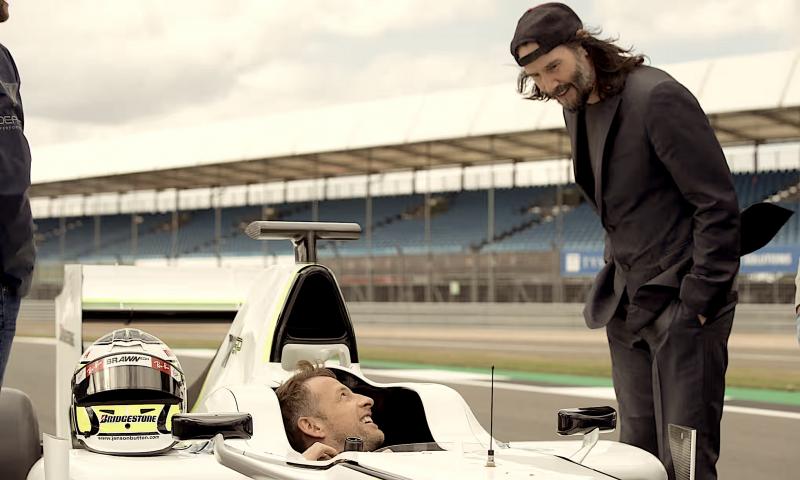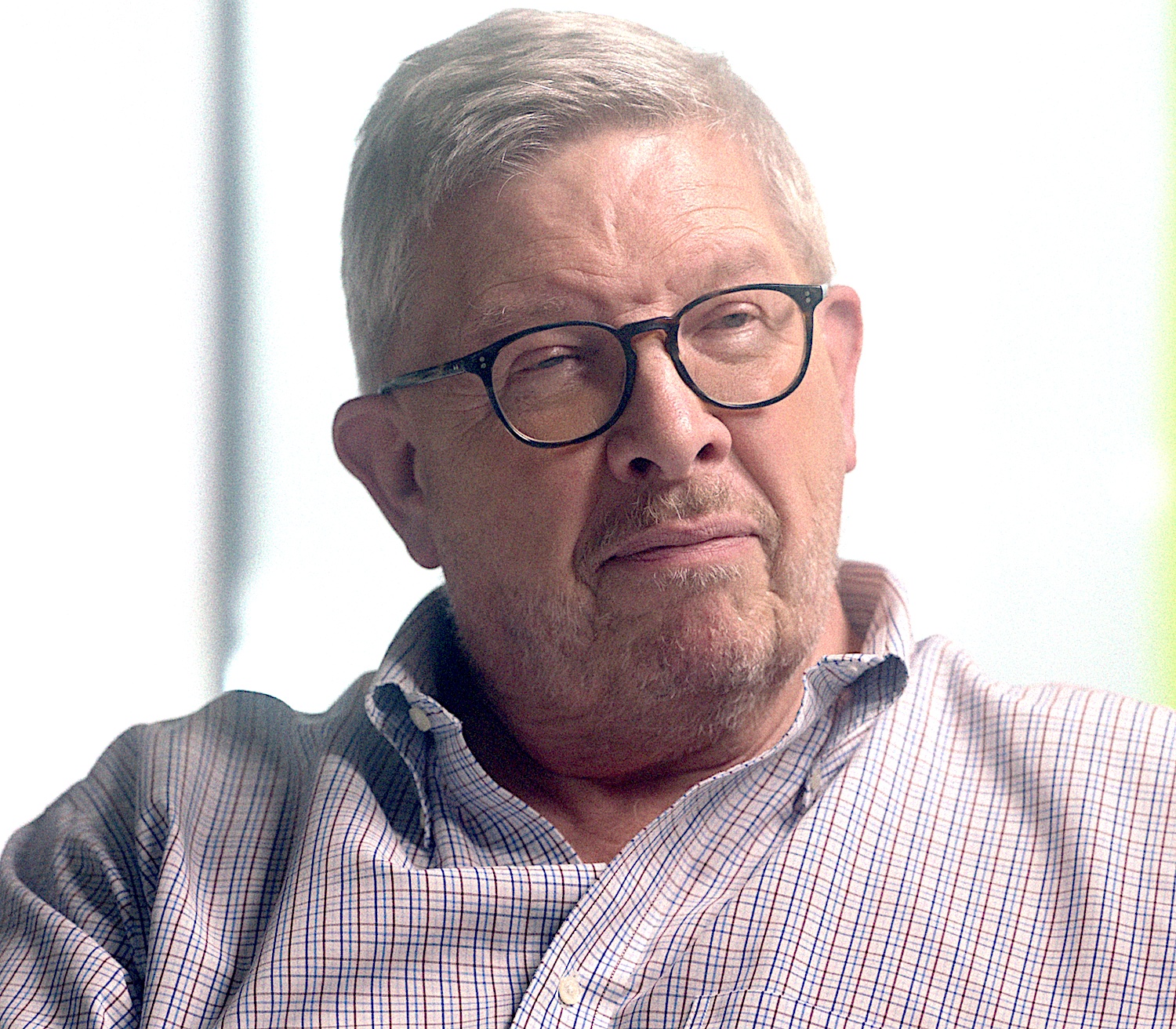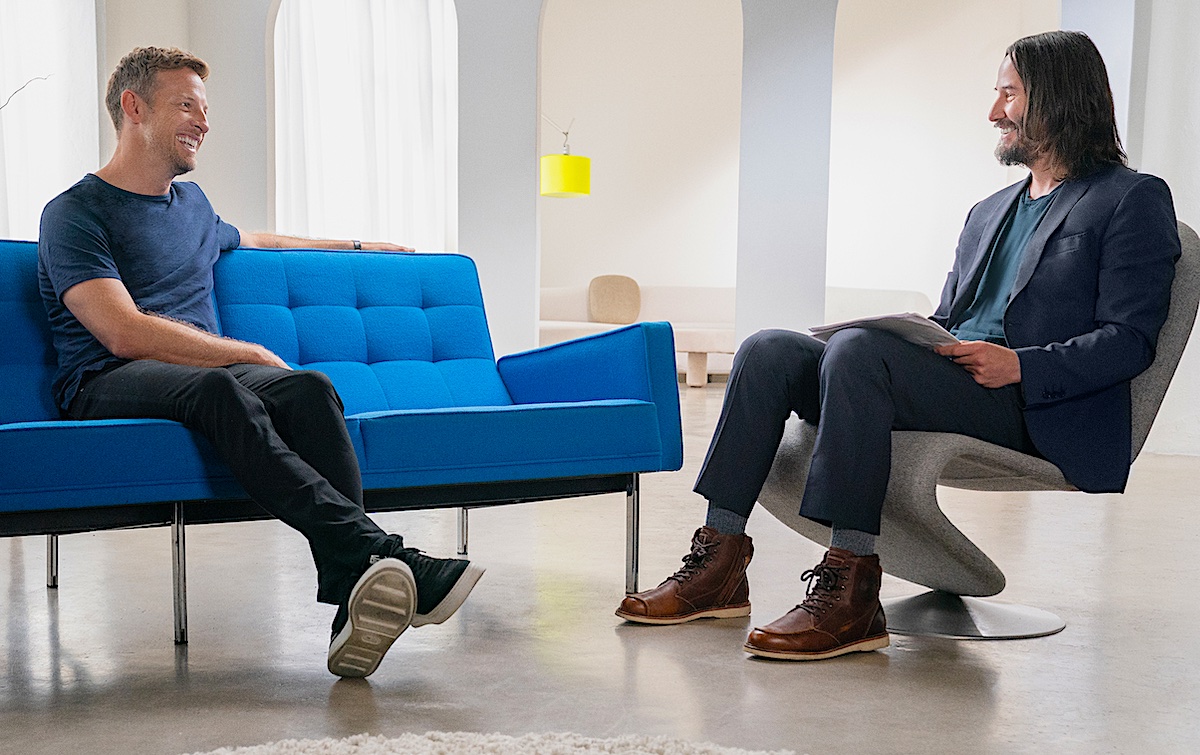Brawn: The Impossible Formula 1 Story, Disney+ review - classic underdog tale of the little team that could | reviews, news & interviews
Brawn: The Impossible Formula 1 Story, Disney+ review - classic underdog tale of the little team that could
Brawn: The Impossible Formula 1 Story, Disney+ review - classic underdog tale of the little team that could
Inside story of Jenson Button's amazing championship year

When they read the roll-call of British Formula One champions, the likes of Jackie Stewart, Graham and Damon Hill and Nigel Mansell tend to grab the spotlight, but Jenson Button’s dramatic and totally unexpected win in 2009 is every bit as worthy of celebration.
It’s a great story, though it undoubtedly helps if you have some interest in F1 to begin with, and it gains an extra jolt of horsepower by having Keanu Reeves as host and interviewer. Sauntering around in a dark suit and back-to-front baseball cap, Keanu looks like John Wick enjoying a well-deserved furlough in some mythical Zen timezone. He also makes a surprisingly effective interviewer, quizzing the lordly denizens of the pinnacle of motorsport with a droll faux-naivety which often elicits more interesting results than you’d get from the usual press corps wallahs. There’s a delightful little exchange with the rottweiler-ish Red Bull boss Christian Horner. Horner opines that Ross Brawn is a nice guy but “a smiling assassin”. “I think you’re all smiling assassins,” chortles Keanu, without missing a beat.
 And how right he is. The Brawn F1 story is a classic underdog’s tale, in which Brawn (pictured right), who’d been boss of Honda’s F1 team, had the rug pulled out from under him by the global financial crisis. With banks collapsing and stockmarkets going berserk, Honda decided they had to pull the plug. Brawn refused to throw in the towel, gathered his loyal troops, and launched a management buy-out rescue operation. He persuaded Honda to chip in a big chunk of the cash they’d have had to pay to close the company, and bought the team for a token £1 from Honda executive Hiroshi Oshima.
And how right he is. The Brawn F1 story is a classic underdog’s tale, in which Brawn (pictured right), who’d been boss of Honda’s F1 team, had the rug pulled out from under him by the global financial crisis. With banks collapsing and stockmarkets going berserk, Honda decided they had to pull the plug. Brawn refused to throw in the towel, gathered his loyal troops, and launched a management buy-out rescue operation. He persuaded Honda to chip in a big chunk of the cash they’d have had to pay to close the company, and bought the team for a token £1 from Honda executive Hiroshi Oshima.
Nonetheless, Brawn GP (as the team was now called) was operating with a skeleton crew and with funding far short of the mega-budgets available to rival teams. As Button – a very engaging interviewee – recalls, the team’s refuelling specialist only worked at weekends for the grands prix, and was a plumber the rest of the time.
Fortune smiled on them, however, when a Japanese aerodynamicist on the team devised the concept of the “double diffuser”. God knows what that is, but it gives cars vastly improved downforce and, in short, lets them get round the track much faster than everyone else. Toyota and Williams had also hit upon the same notion, but Brawn’s version was manifestly superior. Astoundingly, Button won the first race of the 2009 season (the Australian grand prix), with his teammate Rubens Barrichello second. Button won again in Malaysia, on his way to taking six wins during his championship-winning campaign.
 But as well as being the story of Brawn’s remarkable year, the show throws up all kinds of fascinating subplots and perspectives. For instance, the F1 community is initially supportive and helpful to Brawn because they feel sorry for his impecunious plight, but as soon as he starts winning races the going gets uglier. Ferrari boss Luca Montezemolo is immediately up in arms, protesting that Brawn are cheating and have “gone too far”, while Christian Horner observes wryly that “the best way to become unpopular very fast is to start winning.”
But as well as being the story of Brawn’s remarkable year, the show throws up all kinds of fascinating subplots and perspectives. For instance, the F1 community is initially supportive and helpful to Brawn because they feel sorry for his impecunious plight, but as soon as he starts winning races the going gets uglier. Ferrari boss Luca Montezemolo is immediately up in arms, protesting that Brawn are cheating and have “gone too far”, while Christian Horner observes wryly that “the best way to become unpopular very fast is to start winning.”
The extraordinary Brawn story plays out against the backdrop of a potential split in Formula 1, as the teams seek to create the Formula One Teams Association (FOTA). Brawn find themselves under pressure from F1’s machiavellian mastermind Bernie Ecclestone not to join FOTA, on pain of losing a thick wad of cash, but they’re saved by their legal director Caroline McGrory, who scuppers Ecclestone on a legal technicality. Meanwhile, Jenson Button is fighting a personal battle to prove to his father, who’d supported his racing ambitions since childhood, that he really did have the right stuff as a driver, while his teammate Barrichello is desperate to shake off the mantle of being a perpetual Number Two driver, as he previously was to Michael Schumacher at Ferrari. Wheels within wheels, you might say.
The future of Arts Journalism
You can stop theartsdesk.com closing!
We urgently need financing to survive. Our fundraising drive has thus far raised £49,000 but we need to reach £100,000 or we will be forced to close. Please contribute here: https://gofund.me/c3f6033d
And if you can forward this information to anyone who might assist, we’d be grateful.

Subscribe to theartsdesk.com
Thank you for continuing to read our work on theartsdesk.com. For unlimited access to every article in its entirety, including our archive of more than 15,000 pieces, we're asking for £5 per month or £40 per year. We feel it's a very good deal, and hope you do too.
To take a subscription now simply click here.
And if you're looking for that extra gift for a friend or family member, why not treat them to a theartsdesk.com gift subscription?
more TV
 Murder Before Evensong, Acorn TV review - death comes to the picturesque village of Champton
The Rev Richard Coles's sleuthing cleric hits the screen
Murder Before Evensong, Acorn TV review - death comes to the picturesque village of Champton
The Rev Richard Coles's sleuthing cleric hits the screen
 Black Rabbit, Netflix review - grime and punishment in New York City
Jude Law and Jason Bateman tread the thin line between love and hate
Black Rabbit, Netflix review - grime and punishment in New York City
Jude Law and Jason Bateman tread the thin line between love and hate
 The Hack, ITV review - plodding anatomy of twin UK scandals
Jack Thorne's skill can't disguise the bagginess of his double-headed material
The Hack, ITV review - plodding anatomy of twin UK scandals
Jack Thorne's skill can't disguise the bagginess of his double-headed material
 Slow Horses, Series 5, Apple TV+ review - terror, trauma and impeccable comic timing
Jackson Lamb's band of MI5 misfits continues to fascinate and amuse
Slow Horses, Series 5, Apple TV+ review - terror, trauma and impeccable comic timing
Jackson Lamb's band of MI5 misfits continues to fascinate and amuse
 Coldwater, ITV1 review - horror and black comedy in the Highlands
Superb cast lights up David Ireland's cunning thriller
Coldwater, ITV1 review - horror and black comedy in the Highlands
Superb cast lights up David Ireland's cunning thriller
 Blu-ray: The Sweeney - Series One
Influential and entertaining 1970s police drama, handsomely restored
Blu-ray: The Sweeney - Series One
Influential and entertaining 1970s police drama, handsomely restored
 I Fought the Law, ITVX review - how an 800-year-old law was challenged and changed
Sheridan Smith's raw performance dominates ITV's new docudrama about injustice
I Fought the Law, ITVX review - how an 800-year-old law was challenged and changed
Sheridan Smith's raw performance dominates ITV's new docudrama about injustice
 The Paper, Sky Max review - a spinoff of the US Office worth waiting 20 years for
Perfectly judged recycling of the original's key elements, with a star turn at its heart
The Paper, Sky Max review - a spinoff of the US Office worth waiting 20 years for
Perfectly judged recycling of the original's key elements, with a star turn at its heart
 The Guest, BBC One review - be careful what you wish for
A terrific Eve Myles stars in addictive Welsh mystery
The Guest, BBC One review - be careful what you wish for
A terrific Eve Myles stars in addictive Welsh mystery
 theartsdesk Q&A: Suranne Jones on 'Hostage', power pants and politics
The star and producer talks about taking on the role of Prime Minister, wearing high heels and living in the public eye
theartsdesk Q&A: Suranne Jones on 'Hostage', power pants and politics
The star and producer talks about taking on the role of Prime Minister, wearing high heels and living in the public eye
 King & Conqueror, BBC One review - not many kicks in 1066
Turgid medieval drama leaves viewers in the dark
King & Conqueror, BBC One review - not many kicks in 1066
Turgid medieval drama leaves viewers in the dark
 Hostage, Netflix review - entente not-too-cordiale
Suranne Jones and Julie Delpy cross swords in confused political drama
Hostage, Netflix review - entente not-too-cordiale
Suranne Jones and Julie Delpy cross swords in confused political drama

Add comment